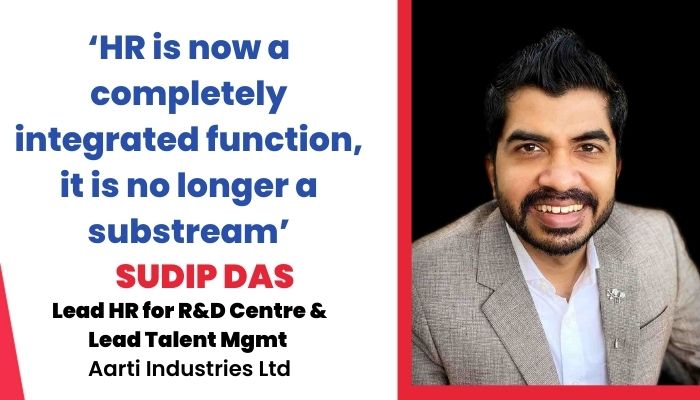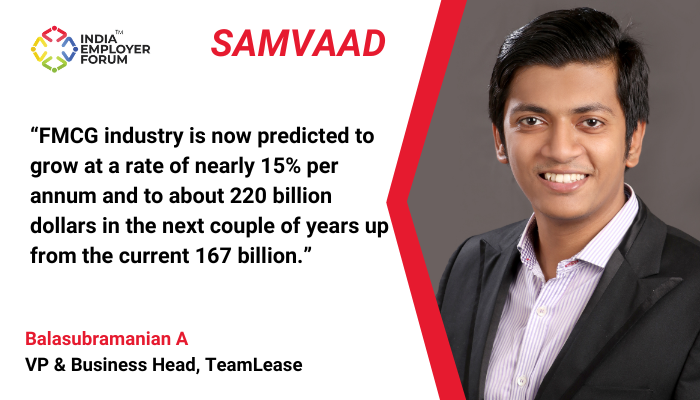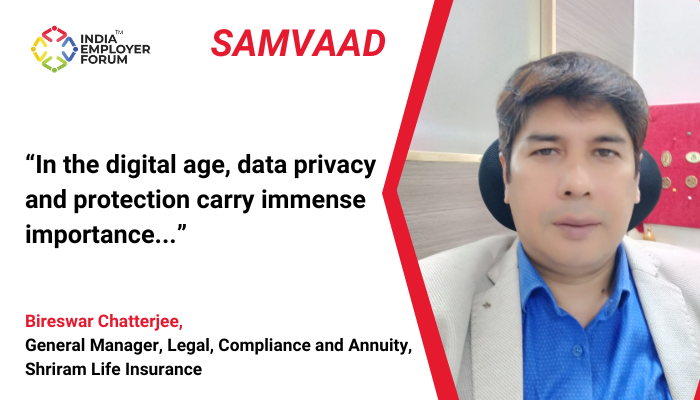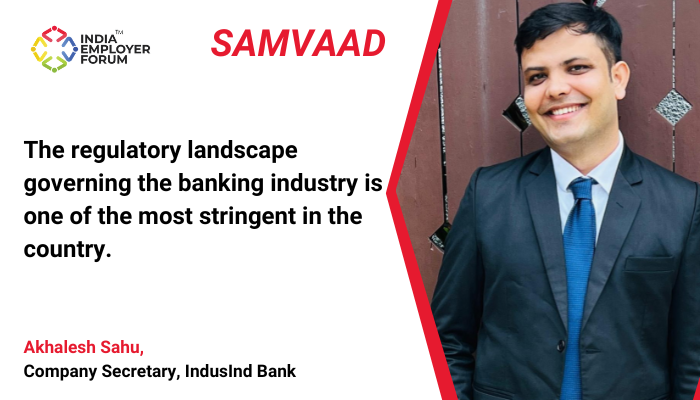Sudip Das, Lead HR for R&D Centre and Lead Talent Mgmt, Aarti Industries Ltd. in a conversation with India Employer Forum on the current and future role of HR tech in the HR function.
Q. Tell us a little about yourself.
I have around 16 years of experience. I have worked in hyper growth as well as amongst the top 100 profit making organisations in India. It’s been a long journey and I’m really blessed to work in all the domains of HR, and also help a lot of people to grow in their career. I have done my MBA from XLRI in 2009 and Engineering from Calcutta University. I am a sports enthusiast and I spend my weekend playing at least 1 sport. I love to travel and rejuvenate myself amidst nature.
Q. What is the most critical investment companies should make today which in turn will have a long term business impact?
India, at this point of time, is just at a phase from where there is going to be exponential growth and that opportunity is there. We are already a strong economy and there are all the required interventions and ingredients to become a superpower in the world economy. How can Indian organisations capitalise on this excellent opportunity? We have a lot of the enabling environments, government policies, the current talent development, all of those ingredients are there. What is the organisation probably to invest in is the meaningful engagement of people. Now, meaningful engagement comes when you also give meaningful growth or a meaningful role, where you are creating the enabling environment. Now, how do we have the mindset of the senior leadership to grow the talent in their life. A lot of times we take a let’s-solve-that-problem approach, the firefighting kind of approach, and we don’t think too much. Often, when there is an exciting position available, you may hire from outside. Now, that is a very short-term approach. The long-term approach is that you are very sure that there will be attrition, there are new opportunities and then as the organisation is growing, opportunities are also going to come up. So, are we preparing our internal talent to take up that kind of role?
Q. The importance of the HR function has started increasing in leaps and bounds, what do you think could be made better in the current way the HR function is looked at by companies?
HR is now a completely integrated function. It is no longer a substream, but a very important function at this point of time. Look at various trends, be it decision-making or compensation expected, HR is now becoming very important. So, what are the insights or the values HR is bringing to the table about yesterday, today and tomorrow? So, the insight about yesterday is to get the exit interview data, get the feedback from the people about the people, managers, etc. These are all your lag indicators. Today, the insights we need to look at are the kind of critical talent we have, the rules we follow and the kind of readiness we have for those people, how many people are really making a lot of contribution, where all we need to improve, etc. So these insights help to completely understand the business, from where it is growing and what kind of bottlenecks do we see in the growth, whether the leadership is ready for the kind of growth, what we are expecting, whether our talent pool is ready, etc. The insight for tomorrow is what is the readiness of the talent pool, whether we believe in the vision and mission of the people and of the organisation.
Q. What are your views on the current and future role of HR Tech in the HR function? In what ways can HR Tech be utilised to provide a competitive advantage to Employers?
HR technology is really evolving and quite powerful. There is a lot of routine work at the workplace and HR technology or technology in any place can bring a lot of quality in each and everybody’s work because the technology is going to take care of the repetitive work. Also, powerful decision making rather than making decisions based on your gut can help to get a lot more data. So, if you automate your recruitment and onboarding, if you automatically exit and various employee life cycle processes start getting a lot of insight. Is your recruitment engine really working powerfully? Are people really giving you reference because a referral is a strong indicator of the engagement of the people. It is only when they believe that this is a great place to work, they obviously are going to refer their relatives and friends. The third one is where HR technology and human intelligence actually have a great collaboration. So, in various processes, HR technology can play a complementary role. For example, recruitment is a large part of it where you can automate and get a lot of information which you may not be aware of while doing the recruitment. You get a large amount of insightful data about human behaviour.
Q. There is a disconnect between the skills that employers need and what the current workforce have. What are the steps and collaborations that can be taken to bridge this skill gap?
Our education system doesn’t teach us some of the critical skill sets. How can you have a conversation where you’re not losing yourself, because a lot of times fear flips in and you don’t talk about what you really want to talk about. So, how can you, as a manager, create a safe environment, where people are absolutely free to talk, free to express and they collaborate. Collaboration is another critical skill and those are not taught in our childhood experiences or a lot of times, our parents still say, don’t do that, it’s not good for you. As a result, what happens a lot of times is that the collaboration itself fails. I am also probably not understanding there is a difference between facts and beliefs.
Watch the full video: In Conversation with Sudip Das, Lead HR for R&D Center and Lead Talent Mgmt, Aarti Industries Ltd.
About Sudip Das
Sudip Das is a Talent Specialist with 15 years of diversified leadership experience in hyper-growing as well as mature top 100 profit-making, complex Indian businesses across Financial Services, Manufacturing, Power Transmission, and Insurance sectors. He has proven experience enabling rapid growth, driving higher customer satisfaction, simplifying processes, and fostering an internal talent pool. He has received recognition across internal & industry forums. He is ardent about Data Analytics and HR Technology and leveraged them to solve people’s challenges.
Sudip has created various breakthroughs in People strategy development, cultural transformations, Change Management, process simplification & digitization, developing leaders, etc. in his current and previous roles. He has pursued a two-year postgraduate course in HR from XLRI, Jamshedpur. He is a sports activist and a keen learner of the financial markets.




